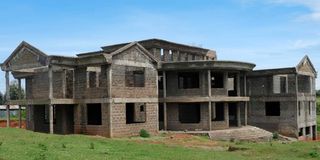SRC reveals why governors must build those swanky residences

The unfinished shell of the Bomet governor’s official residence in October. Its construction has stalled for the past three years after the county government failed to allocate funds for the project.
County governments that are yet to build official residences for governors, deputy governors and assembly speakers risk being cited for violation of a public policy on the housing benefit of the three officials.
Salaries and Remuneration Commission (SRC) chairperson Lyn Mengich told Nation that the June 30, 2022 deadline within which the 47 devolved units were required to have built the residences will not be renegotiated.
“The deadline was not extended therefore, our circular stands,” said Ms Mengich.
Governors, their deputies and county assembly speakers, just like all other state officers, are paid a house allowance. Cumulatively, it cost the taxpayer Sh1.49 billion in rent for governors, deputy governors and assembly speakers in each of the 47 counties.
The figure has been computed from March 1, 2013 to June 30, 2022, which is nine years and four months. Broken down, governors’ official residences consumed Sh560 million, deputy governors Sh505.68 million and assembly speakers Sh420 million.
On May 20, 2019, SRC in a circular issued to all county secretaries and clerks of county assemblies directed that county governments that have not constructed the official residences to ensure they are done by June 30, 2022.
Of the 47 counties, the circular lists Homa Bay and Kajiado as counties that have built residences for the governors and their deputies.
Kilifi has built the governor’s residence, while Isiolo has only completed the deputy governor’s residence. None of the devolved units has done the county assembly speakers’ residences.
SRC had extended the deadline twice to allow counties that have not started the construction of the houses time to allocate funds for the work.
The implication of the May 20, 2019 SRC circular is that the three county officials whose counties are yet to construct their official residences are on their own.
Some governors, their deputies and county assembly speakers have claimed rent money while living in their own houses.
If county governments defy the SRC circular and continue paying rent for the three officials, the matter will be cited as an audit query in the report of the Auditor-General.
The 2017 SRC guidelines that expired on June 30, 2022, show that Nairobi, Mombasa and Kisumu governors each pocketed Sh200,000 in monthly house allowances, with their colleagues in the other counties getting Sh100,000. Deputy governors in Nairobi, Mombasa and Kisumu got Sh185,000 with their colleagues from the other counties getting Sh90,000.
County assembly speakers in Nairobi, Mombasa and Kisumu were paid a house allowance of Sh150,000, with their colleagues from other counties getting half the amount.
Also Read: Mandera governor’s mansion causes stir
As per the SRC circular and guidelines, the cost of constructing governor, deputy governor and speaker residences was capped at Sh45 million, Sh40 million and Sh35 million respectively and the houses must be on public land owned by the county governments.
The house for the governor was to be built on up to two acres and up to one acre each for the deputy governor and county assembly speaker.
While the county assemblies worked hard to approve funds for the construction of the residences, some governors have come out to dismiss it as unnecessary.
Mr Johnson Sakaja (Nairobi) and Mr James Orengo (Siaya) are on record as saying that construction of their official residences is not a priority.
“I have asked them to reallocate the money to other priority projects. I already have a place where I live,” Mr Sakaja said of the Sh500 million that had been allocated by the Nairobi County Assembly for the construction of the residences of the governor and his deputy. The allocation is 10 times above the limit set by the SRC.
Mr Orengo said he would not undertake the project as “my focus lies in improving the lives of Siaya residents.”
However, Controller of Budget Margaret Nyakang’o, despite clarifying that her mandate is confined to budget ceilings of government agencies, said failure to construct the residences could easily be cited as a violation of a policy of the government “in terms remuneration of a state officer”.





